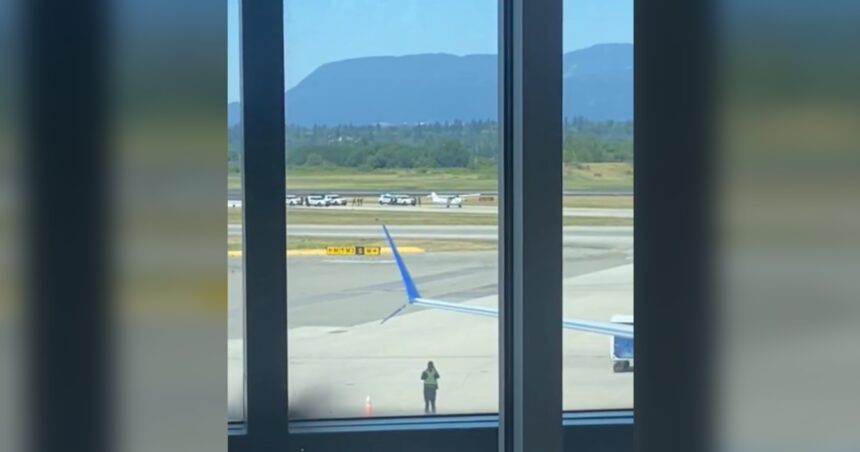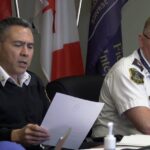As the sun rose over Vancouver International Airport yesterday morning, operations ground to a dramatic halt when a small Cessna aircraft, reportedly hijacked from a flight school in Abbotsford, entered restricted airspace and caused widespread disruption to one of Canada’s busiest transportation hubs.
The incident began shortly after 6:30 a.m. when air traffic controllers detected an unauthorized aircraft approaching YVR’s airspace without proper clearance or flight plan. According to RCMP Superintendent Melissa Chen, the single-engine plane was piloted by a former flight student who had taken the aircraft without permission.
“This was not a terrorist incident,” Chen clarified during an afternoon press conference. “Preliminary investigation suggests this was an individual in crisis who made a series of poor decisions that endangered public safety and disrupted critical infrastructure.”
The disruption forced air traffic controllers to implement emergency protocols, diverting 14 incoming flights to airports in Victoria, Kelowna, and Seattle. Another 27 departures faced delays averaging three hours, affecting an estimated 6,000 passengers according to Vancouver Airport Authority figures.
Passenger Gurdeep Singh, who was waiting to board an Air Canada flight to Toronto, described the scene inside the terminal. “There was confusion at first. The departure board just showed delays, but soon staff were telling us about an airspace security issue. People were remarkably calm, but you could feel the tension.”
The hijacked Cessna 172 circled the airport for approximately 40 minutes while RCMP crisis negotiators established communication with the pilot. Sources close to the investigation indicate the individual had recently been dismissed from a commercial pilot training program and may have been attempting to make a public statement about mental health supports in the aviation industry.
Transport Canada officials have launched a comprehensive review of flight school security protocols following the incident. “This raises serious questions about access controls at smaller aviation facilities,” said Martin Dubois, regional director for aviation safety. “We’ll be working with flight schools across British Columbia to ensure proper safeguards are in place.”
The standoff ended when the pilot, whose identity has not been released pending formal charges, landed the aircraft on a taxiway after negotiators convinced them to surrender peacefully. No passengers or aircraft were directly threatened during the incident, though the economic impact of the disruption is estimated to exceed $2 million according to Vancouver Board of Trade calculations.
For the affected travelers, the incident highlighted both frustrations and compassion. “Of course I’m annoyed about missing my connection in Toronto,” said Megan Williams, who was traveling to Halifax for a family reunion. “But honestly, I’m just glad nobody was hurt. If someone was desperate enough to do this, they clearly needed help.”
Airport operations returned to normal by mid-afternoon, though ripple effects continued throughout the national air transportation network well into the evening. Air Canada and WestJet both implemented flexible rebooking policies for affected passengers.
The incident comes at a challenging time for Vancouver International Airport, which has seen passenger volumes finally recover to pre-pandemic levels this summer. YVR spokesperson Thomas Lee noted that while security protocols worked as designed, the incident highlights the delicate balance between accessibility and security at major transportation hubs.
“Our emergency response team performed exactly as trained,” Lee said. “But this situation demonstrates the unique vulnerabilities that come with operating an airport adjacent to multiple flight schools and in close proximity to densely populated areas.”
Mental health advocates have cautiously addressed the incident, noting the importance of access to support services for those working in high-stress industries like aviation. Dr. Eleanor Pang, a psychologist specializing in workplace mental health, pointed to the rigorous psychological requirements for pilots that sometimes discourage seeking help.
“There’s still significant stigma around mental health issues in professions where people fear losing their licenses or certifications,” Pang explained. “We need systems where individuals can seek support without jeopardizing their careers.”
The event has already prompted calls for a parliamentary review of security protocols at smaller airports and flight schools. MP Katherine Morrison, opposition critic for transportation safety, has requested an emergency committee meeting to address what she calls “significant gaps in our aviation security framework.”
As Vancouver airport returns to normal operations today, investigators continue their work to understand both how this breach occurred and what measures might prevent similar incidents in the future.






